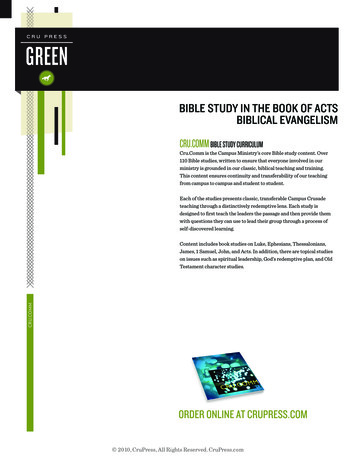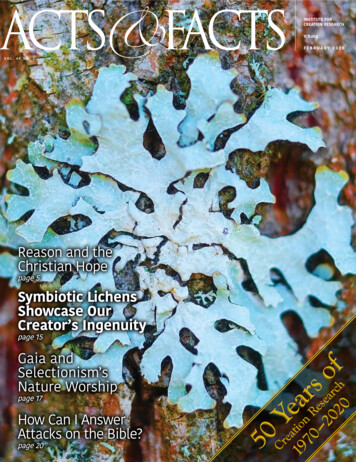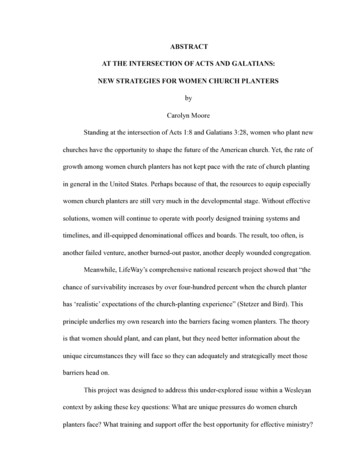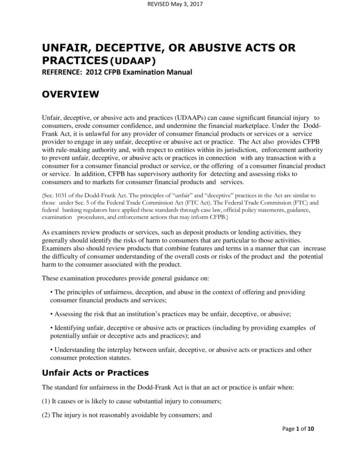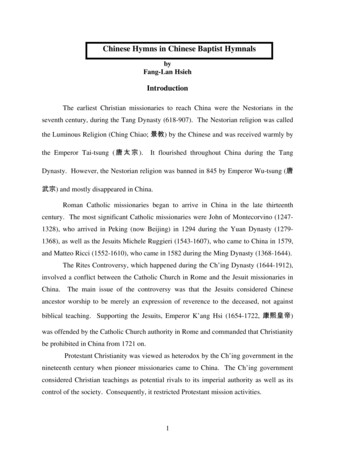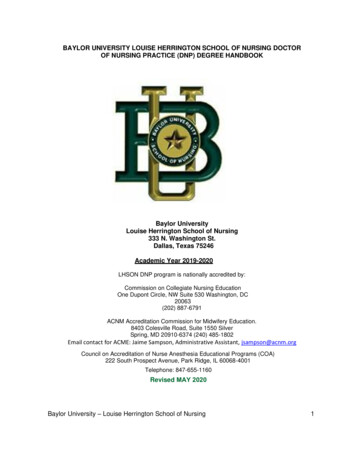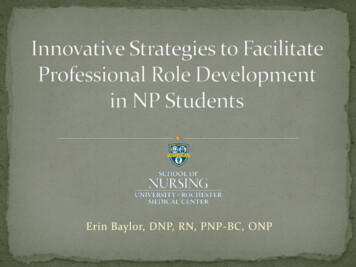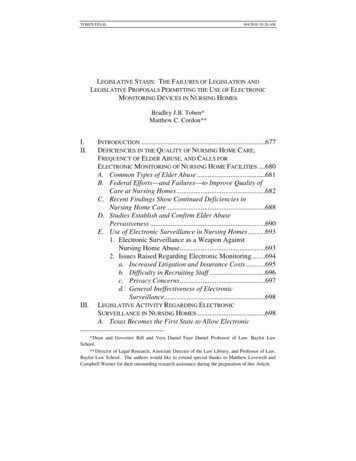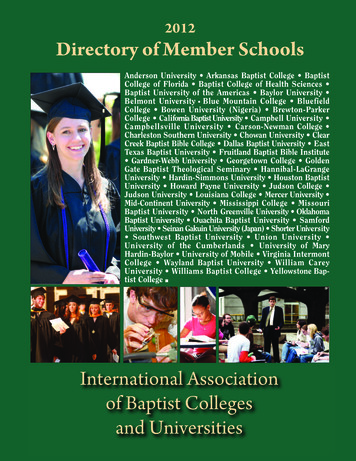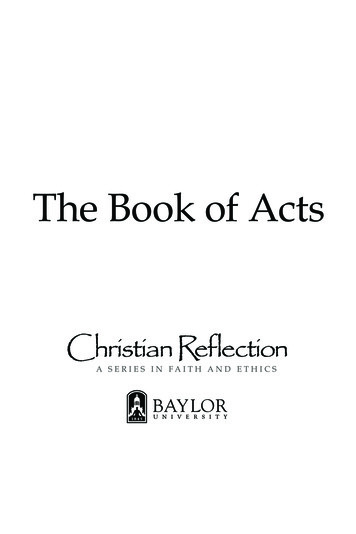
Transcription
The Book of Acts
G E N E R A LE D I T O RRobert B. KruschwitzA rtE di T O rHeidi J. HornikR e v ie wE ditorNorman Wirzbap ro c la m ationE D I T O RWilliam D. ShiellA s s i s tantE ditorHeather HughesD e s ignerP u b l i s h e rP h oneWe bs iteE - m ailEric YarbroughThe Institute for Faith and LearningBaylor UniversityOne Bear Place #97270Waco, TX 76798-7270(254) 710-4805www.ChristianEthics.wsChristian Reflection@baylor.eduAll Scripture is used by permission, all rights reserved, and unless otherwise indicated isfrom New Revised Standard Version Bible, copyright 1989, Division of Christian Education ofthe National Council of the Churches of Christ in the United States of America.ISSN 1535-8585Christian Reflection is the ideal resource for discipleship training in the church. Multiplecopies are obtainable for group study at 3.00 per copy. Worship aids and lesson materialsthat enrich personal or group study are available free on the Web site.Christian Reflection is published quarterly by The Institute for Faith and Learning atBaylor University. Contributors express their considered opinions in a responsiblemanner. The views expressed are not official views of The Institute for Faith and Learningor of Baylor University.The Institute expresses its thanks to individuals, churches, and organizations, includingthe Cooperative Baptist Fellowship, who provided financial support for this publication. 2015 The Institute for Faith and Learning at Baylor UniversityAll rights reserved
ContentsIntroduction8Robert B. KruschwitzA Spirituality of Acts11Reading Acts as a Sequel to the Fourfold Gospel19Paul and the Philosophers27As Christ and Church and Congregation35Worship Service38Spreading the Gospel “To the Ends of the Earth”46Steve WaltonMikeal C. ParsonsTimothy A. BrookinsTerry W. York and C. David BolinAllison BurasHeidi J. HornikThe Healing of the Lame ManThe Death of AnaniasThe Conversion of the ProconsulThe Sacrifice at LystraPaul Preaching at AthensRaphaelOther Voices55Warning to the Wise:Learning From Eutychus’s Mistake57Philanthropy, Hospitality, and Friendship65Repetition for a Reason73Andrew E. ArterburyJoshua W. JippTimothy Churchillcontinued
The Ever-Expanding Gospel78A Story that Teaches: The Theology of Acts82Studying the Book of Acts88Editors94Contributors96Chad HartsockHolly BeersKathy MaxwellChristian ReflectionS tudy G uides & L esson P lansThese excellentcompanions toChristian Reflectionintegrate worship,Bible study, prayer,music, and ethicalreflection for personalor small group study. Free ONLINE www.christianethics.ws. Click on “Free Study Guides.”
www.ChristianEthics.wsStudy Guides & Lesson PlansThese five study guides integrate Bible study, prayer,reflection on themes in The Book of Acts issue.A S piritualityofR eading A ctsas aworship, andA ctsThe book of Acts is focused on God’s mission, as God draws people into hisorbit and brings them into his community, and so its spirituality is missional.God takes the initiative using a variety of creative means, and people respondin community to the awesome God who makes himself known in Jesus andby the Spirit.S equelto theF ourfold G ospelThe book of Acts was intended to be a sequel to a plurality of Gospels,which Luke refers to as “many.” Thus, to read Acts for all it’s worth, it isnecessary to attend to the connections not only with Luke’s Gospel, but alsowith those other narratives that recount the story of Jesus echoed in Acts.P auland theP hilosophersPaul’s speech to the Areopagus Council is a paradigm for “cross-worldview”evangelism. He restates the good news in terms that maintain commonground where a similarity of viewpoints is at hand, but retains thedistinctiveness of his message on points that allow for no compromise.W arningto theW ise : L earningfromE utychus ’ s M istakeThe downfall of Eutychus is, to modern ears, a strange story. (We are morelikely to criticize Paul’s long-winded preaching than the youthful listenerwho dozes off.) But the story offered moral guidance to ancient readers,exhorting them to learn from Eutychus’s youthful mistakes and to avoidspiritual laxity at all costs.P hilanthropy , H ospitality ,andF riendshipThe story of Paul’s sea-voyage to Rome—with a violent storm, shipwreck,and adventures on Malta—provides not only a glimpse of Paul as one whowas open to fresh encounters with all peoples but also, surprisingly, alasting impression of Gentiles as receptive, friendly, and hospitable.
Reliable guidancein engaging the ethical dimensionsof today’s worldPast Issues:Prophetic EthicsAging s Consumerisms MysticismParables s Suffering s MarriageChildren s Apocalyptic VisionSports s The Pornographic CulturePeace and War s EasterChristianity and Islam s CloningForgiveness s Women and the ChurchSermon on the Mount sPrayerImmigration s Where Wisdom Is FoundMoral Landscape of CreationPeace and War s Friendship s AcediaInklings of Glory s Health s VocationGlobal Wealth s Sabbath s FreedomFood and Hunger s MembershipCatechism s Racism s HospitalitySinging Our Lives s Cities and TownsAdvent Ethics s Heaven and HellSchools in a Pluralist Culture s AngerMonasticism Old & New s PrisonVirtual Lives s The Gambling CultureChristmas and Epiphany s ScriptureThe Letter of James s DisabilityCaring for Creation s LentWomen in the Bible s DeathForthcoming Issues:PentecostWorkGenerosityPatience
HOW DO YOU REQUEST A FREE SUBSCRIPTION?Christian Reflection is an ideal resource for discipleship training in theChurch. To request a free subscription to this printed version, pleasecontact us through our Web site or by phone. Your free subscriptionwill begin with the forthcoming issue.www.ChristianEthics.wsphone (toll-free): 1-866-298-2325ARE BACK ISSUES AVAILABLE?Download and print free PDFs of Christian Reflection past issues, studyguides, and lesson plans from our Web site. Multiple print copies of thecurrent issue and many back issues can be purchased at 3.00 per copy.Please check our Web site or phone us for availability.HOW CAN YOU SUPPORT CHRISTIAN REFLECTION?Please continue to pray for this publication series. Share past copies ofChristian Reflection with your friends, direct them to the Web site for freePDF versions of past issue contents, and encourage them to requesttheir free subscription to the print edition.If possible, make a financial gift. Simply go tothe Web site, click on “Donate,” and press thebutton to enter a secure online form. Becauseyour gift to the Institute for Faith & LearningExcellence Fund is a tax-deductible charitabledonation to Baylor University, you will receive agrateful acknowledgement from the University.
8The Book of ActsIntroductionB yR obertB .K ruschwit zThe Acts of the Apostles is a hidden treasure in the NewTestament. John Chrysostom found it “replete withChristian wisdom and sound doctrine” to guide believers.Our contributors explore the book of Acts as a theologicaltreasure that can engage and shape our discipleship today.The Acts of the Apostles is a hidden treasure in the New Testament,John Chrysostom famously proclaimed in the fourth century. Herealized that many of his congregants were “not even aware thatthere is such a book in existence” which recounts how God, through theexalted Jesus Christ and the Holy Spirit, continued to guide in an intimateway the Apostles and the early churches. However, Chrysostom urged hispeople to study this short book, for it “may profit us no less than even theGospels—so replete is it with Christian wisdom and sound doctrine.” Ourcontributors take up his challenge to explore the book of Acts as a theologicaltreasure that can engage and shape our discipleship today.The book of Acts is thoroughly “missional,” Steve Walton explains inA Spirituality of Acts (p. 11), for it “is focused on God’s mission, as Goddraws people into his orbit and brings them into his community.” Yet asGod engages people through visions and dreams, Scripture interpreted inlight of Jesus, the gospel message, and the name of Jesus, their response isoften uneven. Walton observes, “Luke’s realistic portrayal of the slownessof religious people to change highlights that Acts presents no picture ofunhindered progress of the gospel from Jerusalem to Rome, but ratherbelievers’ mixed response to God, warts and all.” Chad Hartsock expandson the book’s missional character in The Ever-Expanding Gospel (p. 78).
Introduction9“Acts re-calls us to a radically selfless gospel whose mission is to reach theends of the earth,” he writes. “It reminds us that the ‘ends of the earth’ canbe in a land far away, or among the socially marginalized neighbors wholive in our shadows every moment.”How is the book of Acts related to Luke’s Gospel? Mikeal Parsons notesin Reading Acts as a Sequel to the Fourfold Gospel (p. 19) that there is no evidencethe two documents ever circulated together as two parts of a literary whole.For that and other reasons, he concludes, “The book of Acts was intended tobe a sequel to a plurality of Gospels, which Luke refers to as ‘many.’ Thus,to read Acts for all it’s worth, it is necessary to attend to the connections notonly with Luke’s Gospel, but also with those other narratives that recountthe story of Jesus echoed in Acts.”Several contributors draw attention to the intersection of Luke’sremarkable literary skills and theological vision of discipleship. In Repetitionfor a Reason (p. 73), Timothy Churchill explores how Luke presents threetimes, in slightly different and expanding ways, the story of Paul’s encounterwith Jesus on the Damascus road. This allows Luke not only to emphasizePaul’s apostolic authority and present the gospel in kernel form, but also tocommend a very high Christology in which “Jesus is presented in ways previouslyreserved for God alone.” Timothy Brookins admires the rhetorical artistry of theapostolic sermons as they are presented in Acts, especially Paul’s address tothe Areopagus Council in Athens. This speech stands as “a paradigm for‘cross-worldview’ evangelism,” Brookins writes in Paul and the Philosophers(p. 27), for “the Apostle restates the good news in terms that maintaincommon ground where a similarity of viewpoints is at hand, but retains thedistinctiveness of his message on points that allow for no compromise.”Andrew Arterbury’s Warning to the Wise: Learning from Eutychus’s Mistake(p. 57) explains how Luke’s earliest readers would spot a moral warning inthis account of a young man’s untimely sleep, fall, death, and resuscitation.Luke, the narrative artist, weaves familiar themes of night worship in upperrooms, watchfulness, and spiritual laxity into his story. Arterbury writes,“Just as we are tempted to begin reading the story of the early Christianstoo triumphantly, we encounter a horrible mistake. As we begin wonderingif they are now immune to spiritual slumber, we see Eutychus drift awayand experience tragic consequences.” In Philanthropy, Hospitality, and Friendship(p. 65), Joshua Jipp interprets the adventure story of Paul’s sea voyage, shipwreck, and rescue to Malta before he finally arrives in Rome. This narrative,which at first glance looks like an unusually long sidebar, turns out to be asophisticated instruction that is central to Luke’s theology: it “provides notonly a glimpse of Paul as one who was open to fresh encounters with allpeoples but also, surprisingly, a lasting impression of Gentiles as receptive,friendly, and hospitable.” We can learn much from this story about the rolesthat friendship, generosity, and welcome to the stranger must play in ourown pilgrimage in the mission of God.
10The Book of ActsIn the history of art, “the most thorough set of paintings from Acts” areRaphael’s cartoons for the design of ten tapestries in the Sistine Chapel, HeidiHornik observes in Spreading the Gospel “To the Ends of the Earth” (p. 46).One of these, Paul Preaching at Athens (cover), depicts the famous Areopagusspeech. Seven of the cartoons, or designs for large-scale tapestries, survivetoday, and Hornik explores the iconography of the five of these that relateto the book of Acts.The worship service (p. 38) by Allison Buras reminds us of the role thatActs readings play during the weeks of Eastertide, when they point to therisen and exalted Christ’s continuing guidance to the Church. The liturgyfeatures a new hymn by Terry York with music by David Bolin, “AsChrist and Church and Congregation” (p. 35), that captures the missionalspirituality of the book of Acts.In Studying the Book of Acts (p. 88), Kathy Maxwell commends severalsection-by-section commentaries on the book of Acts: J. Bradley Chance’sActs in the Smyth & Helwys Bible Commentary series, Beverly Gaventa’sActs in the Abingdon New Testament Commentaries, Mikeal C. Parsons’sActs in Paideia: Commentaries on the New Testament, and Michael Mullins’sThe Acts of the Apostles. While these four “well-researched, clearly written”volumes “adopt different approaches and formats,” she notes that “theyshare a common interest in theological application, carefully informed bythe historical and literary context of Acts.”In A Story that Teaches: The Theology of Acts (p. 82), Holly Beers begins byasking, “How do stories teach us?” She notes that “it is one thing to insist,as the Church often has, that the story narrated in the book of Acts teachesus; it is quite another to explain exactly how this teaching is done.” Shefinds the most accessible answers to her question in Darrell L. Bock’s ATheology of Luke and Acts: God’s Promised Program, Realized for All Nations,which toes an evangelical line, and Luke Timothy Johnson’s Prophetic Jesus,Prophetic Church: The Challenge of Luke-Acts to Contemporary Christians, whichdescribes Acts as “utopian imagination” that nevertheless challenges thecontemporary church on many levels. Beers admits that C. Kavin Rowe’sWorld Upside Down: Reading Acts in the Graeco-Roman Age is a more difficultread, but she thinks it is worth the effort. Rowe argues “Luke’s second volumeis a highly charged and theologically sophisticated political document thataims at nothing less than the construction of an alternative total way oflife—a comprehensive pattern of being—one that runs counter to thelife-patterns of the Graeco-Roman world.” The book of Acts emphasizesthat Christian discipleship is counter-cultural, but not illegal; it (in Beerswords) “rejects violence as a way to ground peaceful community andinstead witnesses to the Lord’s life of rejection and crucifixion by living it inpublic communities derisively called Christian.” Beers concludes, “Thequestion for and the critique of the Church today is clear: is Christianembodiment proclaiming Jesus’ universal Lordship?”
Copyright 2015 Institute for Faith and Learning at Baylor University11A Spirituality of ActsB yS teveW altonThe book of Acts is focused on God’s mission, as Goddraws people into his orbit and brings them into hiscommunity, and so its spirituality is missional. God takesthe initiative using a variety of creative means, and peoplerespond in community to the awesome God who makeshimself known in Jesus and by the Spirit.The word “spirituality”—now there’s a vague and imprecise term!Some use it as an opposite of “religion,” as in “I’m spiritual but notreligious”; others use it as a way of speaking of their inner life—forinstance, many people meditate on a regular basis and regard this as a“spiritual” practice. So to speak of spirituality in Acts requires some clarityover what we are seeking; otherwise it is a term which means nothingbecause it includes everything.This dimension is vital to understanding earliest Christianity: it is alltoo easy to treat the Christian faith as either a set of intellectual beliefs or aseries of ethical demands, and thus miss its crucial dimension of engagementwith and experience of God as known in Jesus and by the Spirit.1 The contentof Christian belief is important, of course, and so is the lifestyle that goeswith following Jesus, but both of these flow from and articulate the realityof Christian encounter with God—and the book of Acts is full of suchencounters. So that is where we shall focus, on what Stephen Barton calls“the sense of the divine presence and living in the light of that presence.”2To read Acts is to read a book whose focus is outward, not inward. Wefind little description or discussion of believers’ inner lives here—Acts is
12The Book of Actsconcerned with God’s mission in and to the world, to restore and renewcreation, individuals, the nation of Israel, and the whole world. Missiontheologians speak of missio Dei, “the mission of God,” as the key way tothink about mission. This means putting the accent on what God is doing:humans are to look for what God is doing and to join in, rather than to drive“mission” using their own ideas and wisdom. This approach is right in tunewith Acts. Again and again, we read in Acts of God taking the initiative andmoving to meet and engage with individuals and groups. Often these arenot the kinds of people the earliest (Jewish) believers would naturally associatewith, for God loves and reaches out to hated Samaritans (Acts 8:4-25), anEthiopian (8:26-40), a “god-fearing” Roman centurion and his household(10:1–11:18), and even worshippers of pagan gods in Lystra (14:11-18).The spirituality of Acts, then, is a missional spirituality. It is spiritualityfor those following God and engaging in the mission that God initiates anddrives. It is spirituality for the journey, rather than for the settled life. So weshall study Acts first for the ways God moves towards humans, and then forthe ways that we humans respond to God’s initiatives.HOW GOD MOVES FIRSTGod uses a variety of agents and means to engage with people in Acts,but always with the drive toward reaching out to others who are not yetpart of the believing community.God is God’s own agent much of the time in Acts, specifically in thepersons of the exalted Jesus and the Holy Spirit.Consider, first, Jesus himself. Some claim that Jesus disappears from thescene when he ascends to the Father (Acts 1:9-11), and that the Holy Spirit ishis alter ego who acts in Jesus’ place—something like Batman acting forBruce Wayne.3 This misunderstands both the present place of Jesus and thenarrative of Acts. Jesus’ present location is in heaven, in the seat of power inthe universe, where he now reigns at God’s right hand (2:33): in the ancientworld, the right hand of a king is the place for his most trusted adviser andhelper. Thus Peter identifies Jesus following his exaltation as “Lord,” theGreek form of the name for the God of Israel in the Old Testament (2:36).“Lord” is not the same as “Messiah,” Jesus’ other title in 2:36. Jesus is Messiahby virtue of his resurrection, for this is how God has vindicated him fromthe mistaken human verdict of crucifixion (2:23-24); but Jesus is “Lord” byvirtue of his exaltation to heaven (1:10-11), to the place of power and rule.He now pours out the Spirit (2:33), something that Yahweh, and Yahwehalone, does in previous times; in other words, Jesus functions and acts asYahweh alone can.4 To encounter Jesus is to encounter the God of Israel.Because Jesus is exalted in this way, he directs and leads the mission ofthe believing community at key times. When the Spirit comes at Pentecost,it is striking that Peter’s speech, after a short explanation of the day’sremarkable events (Acts 2:14-21), focuses on Jesus (2:22-36), the one who
A Spirituality of Acts13gives the Spirit. The first martyr, Stephen, has a vision of the exalted Jesus,and Stephen’s announcing it to the examining council leads them to stonehim to death (7:55-58). Jesus stands to welcome his faithful servant (7:55).When Saul of Tarsus’s life is turned around on the Damascus road, it is theexalted Jesus who meets Saul (9:4-5). Saul quickly recognizes Jesus’ authority,asks his identity, and then does as Jesus tells him (9:5-6). Jesus, “the Lord,”prepares for Saul’s integration into the believing community by appearingfrom heaven to call Ananias to help Saul by baptizing him and laying handson him for healing (9:10-16). The exalted Jesus heals the bedridden Aeneas(9:34), and in other healing stories Jesus’ name stands for his person andsignals his activity (e.g., in 3:6, 16; 4:7, 17, 30). As Douglas Buckwalterexplains, “What believers do in Jesus’ name is in effect being done by Jesushimself.”5 The power of Jesus’ name is also effective in throwing out evilspirits (16:18; cf., comically, 19:11-17). By Jesus’ name alone are people“saved” (4:12)—here is the divine initiative to reach out and draw peopleinto God’s ways and purposes for planet Earth.Consider now the Holy Spirit. Some regard Acts as a narrative of theSpirit’s work, an “Acts of the Holy Spirit.” This is not the whole story, for(as we have just seen) the exalted Jesus is deeply involved in the mission ofGod. However, the Spirit is highly significant as an agent of God reachingout. In Acts, the Holy Spirit acts as the organ of God’s communication withhumans, in five principalways: revelatory visions anddreams (e.g., Acts 7:55; cf.2:17); revelatory instructionGod uses various agents and means toor guidance (e.g., 8:29, 39;10:19-20; 11:28); charismaticengage with people, but always with thewisdom and discernment(e.g., 6:3, 5); charismaticdrive toward reaching out to others who arepraise (e.g., 2:4, 11b); andcharismatic preaching andnot yet part of the believing community. Godteaching (e.g., 2:14-36; 4:8-12,29-31). 6 The Spirit drivesis God’s own agent often, specifically in theand enables the divine outreach, and provides evidence exalted Jesus and the Holy Spirit.that it really is God at work.Hence Peter defends his visitto the Gentile centurion Cornelius by pointing to the Spirit’s falling onthis Gentile gathering, and this convinces his critics (11:15-18; cf. 15:8).The Spirit in Acts is primarily (but not exclusively) the missionary Spirit,empowering God’s people to draw others into the circle of faith, andengaging with those outsiders directly (e.g., the Lystran man’s faith maycome from the Spirit, 14:9).
14The Book of ActsConsider finally the appearances of divine messengers whom Luke calls“angels.” In similar ways to the Spirit, they act as God’s mouthpieces,communicating God’s purpose and will. An angel sends Philip into thedesert to meet the Ethiopian eunuch and lead him to faith in Jesus (Acts8:26). Cornelius sees an angel who tells him to send for Peter, who isinstrumental in the household’s conversion (10:3-6). Paul receives angelicreassurance that God will keep him safe amidst a great sea storm, in orderto bear witness before Caesar (27:23-24). Through these messages Goddirects the missio Dei. Angels also act in space and time: Peter is freed fromprison twice through angelic intervention (5:19; 12:7-11), and his freedomenables him to continue his mission work.What, then, are the means of God’s engagement with his people? Fourare striking, and each resonates with Christian experience through thecenturies, including today.God engages with people through visions and dreams. Recall that Peterinterprets Pentecost through the lens of Joel’s prophecy which includes theSpirit causing “your young men [to] see visions and your old men [to]dream dreams” (Acts 2:17, quoting Joel 2:28). Luke portrays such events asways God speaks. Ananias encounters “the Lord” (Jesus) in a vision, tellinghim to go to Saul, a very surprising event (9:10-12)—and Saul will become akey missionary. Cornelius’s experience of the angel is “in a vision distinctly”(10:17)—and through responding, he comes to faith in Jesus. Paul has avision of a man from Macedonia (16:9), which leads to the mission in Philippi.In this case, Luke writes that “a dream was seen by Paul,” and the passiveverb suggests this is a “divine passive” signaling that God is the vision’ssource. Such visual experiences need interpretation: the group with Paulconclude from the Macedonian man’s message that God calls them to gothere (16:10; cf. 1 Thessalonians 5:20-21).7Secondly, Scripture interpreted in light of Jesus is a key means of encounterwith God. “Scripture” here means the Old Testament, of course. Peter modelssuch interpretation in his exposition of Joel 2:28-32 and Psalms 16:8-11;132:11; and 110:1 in the Pentecost speech (Acts 2:14-36). Through Peter’sexposition, the crowd hear God and realize they need to respond. Guidedby Peter’s answer to their question, “What must we do?” (2:37), they repentand are baptized into Jesus’ name and join the renewed, Spirit-filled peopleof God (2:38-39). Similarly, believers interpret their experience through thelens of Scripture and Jesus as suffering Messiah. Their response to Peter andJohn being forbidden by the Jewish Council to speak in Jesus’ name (4:18, 21)is to pray guided by Scripture, as they interpret recent events using Psalm2:1-2 (4:25-28). God responds to their request for boldness and power inabundance (4:29-31); through Scripture interpreted in the light of Jesus,God meets his people and equips them for outreach.Luke designates a third, linked, means, as “the word of the Lord” or “theword of God.” This phrase denotes the gospel message, which Luke portrays
A Spirituality of Acts15as active in the world. The word regularly transforms lives (e.g., thesummaries in Acts 6:7; 12:24; 13:49). The word is also the preaching of theeye- and ear-witnesses of Jesus, through which people encounter Godseeking and finding them.A fourth means of God encountering people is the name of Jesus: throughit comes healing (Acts 3:6, 16; 4:10), signs and wonders (4:30; 8:12), forgiveness(10:43), deliverance from demonic power (16:18), and salvation (4:12). Waterbaptism is into Jesus’ name (2:38; 8:12, 16; 10:48; 19:5; 22:16),8 which suggeststhat baptizands called on Jesus, or the baptizer(s) invoked Jesus’ name, asthey were baptized—either way, baptized people met the living and exaltedJesus through the waters of baptism.In sum, Acts portrays God—Father, Son, and Spirit—as activelyengaged in the world, seeking humans to join in their mission. God is theinitiator and driver of this mission, and its key end—for it is through themission that people encounter God-in-Christ by the Spirit, and are beingtransformed into the people God calls them to be.H O W H U M A N S R E SP O N D T O G O DIf this is how God engages with humans, what does human responseto God in Acts look like? We focus primarily on “direct” engagement withGod, rather than how people relate to others as a result of encounteringGod. Notice five major features of people’s response.First, human responseis frequently slow and partial.People do not alwaysgrasp what God is sayingor what God desires. A keyexample is the developmentof the mission amongpeople who are not Jewish.Luke portrays the progressof Gentile admission tothe believing communitiesas very gradual, eventhough (with hindsight)it is driven by God.Philip is an “early adopter” of the Gentile mission,but must accept that God issending him to a strange place (the desert road, Acts 8:26), and even thenhas to be prompted by the Spirit to approach the Ethiopian eunuch (8:29).It is only when Philip hears the eunuch reading Scripture (aloud, for allancient reading was aloud) that Philip realizes this is a divine appointmentand he must speak about Jesus to this high-ranking Ethiopian civilHow does God engage with his people? Fourways are striking, and each resonates withChristian experience. God engages themthrough visions and dreams, Scriptureinterpreted in light of Jesus, the gospelmessage, and the name of Jesus.
16The Book of Actsservant (8:30). It takes several means by which God takes the initiativebefore Philip responds appropriately.Peter is another of the first Jewish believers to connect with Gentiles, as hegoes to meet the Roman centurion Cornelius and his household. Again thereis a divine appointment, for an angel appears to the Roman (Acts 10:3-6), andPeter has a baffling vision (10:9-17a) which he only “gets” after the Spirit promptshim to welcome Cornelius’s slaves and soldier (10:19-20)—such a prompt persuades Peter the Jew to allow Gentiles (presumed unclean) to eat with him.The issue rumbles on as (Jewish) believers in Jerusalem criticize Peterfor eating with Gentiles (Acts 11:3). Peter’s telling of God’s initiative insending him to Cornelius (in 11:4-17 telling the story from Peter’s perspective),and particularly in pouring the Spirit on Gentiles, convinces the Jerusalembelievers. Even so, the surprise in their voices is evident: “even to the Gentiles”(11:18, my italics).The Cornelius story does not close the debate, for Paul and Barnabaslater debate with Jewish, Pharisaic believers who regard circumcision andkeeping the Jewish torah as necessary for salvation (Acts 15:1-2, 5). Lukereports the Jerusalem gathering which resolves the issue by setting outconditions for fellowship between Jewish and Gentile believers, conditionswhich exclude circumcision (15:19-20, 28-29).Even then, when Paul visits Jerusalem, false rumors about his stance oncircumcision abound, and Paul agrees to participate in a Jewish ceremony todemonstrate that he is not abandoning his Jewishness (Acts 21:20-26). Paul’sgoing the extra mile leads to a riot (21:27-36), which initiates the chain ofevents that finally takes him to Rome.Luke’s realistic portrayal of the slowness of religious people to change—realistic to those of us involved in congregations today!—highlights that Actspresents no picture of unhindered progress of the gospel from Jerusalem toRome, but rather believers’ mixed response to God, warts and all.Secondly, believers’ response to God is corporate and community-centered.Acts 2:42-47 is rightly seen as “programmatic” for the community’s life, forit lists features of the church’s life that recur in later sections about believers’meetings. All these activities flow from the Spirit’s pentecostal coming, andare expressed using plural verb
Free ONLINE www.christianethics.ws. . ‘cross-worldview’ evangelism,” Brookins writes in Paul and the Philosophers (p. 27), for “the Apostle restates the good news in terms that maintain common ground whe
